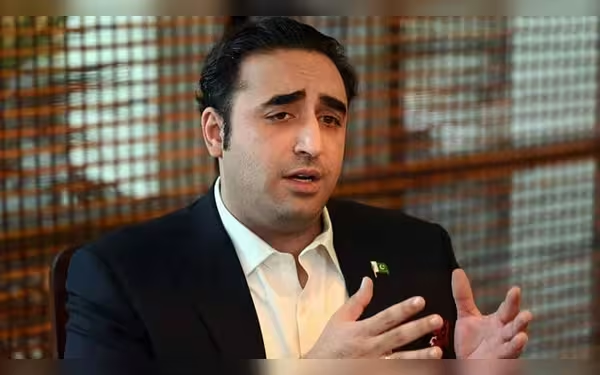Saturday, November 16, 2024 03:16 PM
Bilawal Declares Justice Mansoor as Next CJP Amid Judicial Reform Uncertainty
- Bilawal announces Justice Mansoor as next Chief Justice.
- Government's constitutional package postponed indefinitely.
- Judicial reforms remain uncertain as political tensions rise.
 Image Credits: geo
Image Credits: geoBilawal Bhutto-Zardari announces Justice Mansoor as next CJP as judicial reform faces uncertainty amid political tensions.
In a significant political development, Pakistan Peoples Party (PPP) Chairman Bilawal Bhutto-Zardari has declared that Justice Mansoor Ali Shah will be the next Chief Justice of Pakistan (CJP). This announcement comes on the heels of the government postponing the introduction of a "controversial" constitutional package in Parliament, which has left many questions about judicial reform in the country.
Bilawal made this statement during an interview with a private news channel, asserting, "On October 26, Justice Mansoor will become the next chief justice — no doubt." His confidence in Justice Mansoor's appointment reflects the ongoing political maneuvering as the current CJP, Qazi Faez Isa, is set to retire this month.
The government had previously claimed to have secured the "magic number" required to pass the constitutional amendments. However, the lack of support from Jamiat Ulema-e-Islam (JUI-F) chief Maulana Fazlur Rehman has stalled these efforts. Senior Pakistan Muslim League-Nawaz (PML-N) leader Senator Irfan Siddiqui confirmed that the government's attempt to table the constitutional package has been "postponed indefinitely." This delay raises concerns about the future of judicial reforms in Pakistan.
As the retirement of CJP Isa approaches, the government has intensified its push for constitutional amendments, which reportedly include proposals to extend the tenure of CJP Isa and adjust the retirement age for judges. However, the failure to gain consensus from key political figures has complicated these efforts.
During his remarks, Bilawal expressed disappointment over the current state of both the parliament and the judiciary, stating, "We waited almost 50 years for justice in Shaheed [Zulfiqar Ali] Bhutto’s murder case." He highlighted that political cases make up only 15% of the Supreme Court's workload, yet they consume 90% of its time, underscoring the urgent need for judicial reforms.
Bilawal also pointed out that the Truth and Reconciliation Commission, promised under the Charter of Democracy, remains unformed. He emphasized the PPP's commitment to reforming the National Accountability Bureau (NAB) and the judiciary, indicating a desire for a more effective legal system.
In a bid to foster cooperation, Bilawal expressed hope that Pakistan Tehreek-e-Insaf (PTI) would play a constructive role as the Opposition. However, he lamented that recent statements from Imran Khan have hindered productive engagement. "It is difficult for [the government] to discuss constitutional amendments with PTI along with its input," he noted.
Furthermore, Bilawal acknowledged the PPP's lack of numbers in parliament, stating, "PPP will prepare its draft regarding the formation of the constitutional court and will share it with Maulana Fazl." He mentioned that JUI-F is also working on its own draft, with efforts underway to reach a consensus on a joint proposal.
As the political landscape continues to evolve, the uncertainty surrounding judicial reforms and the appointment of the next CJP remains a critical issue for Pakistan. The outcome of these discussions will not only shape the future of the judiciary but also influence the broader political dynamics in the country. It is essential for all political parties to engage in constructive dialogue to ensure that the rule of law and justice prevail in Pakistan.













